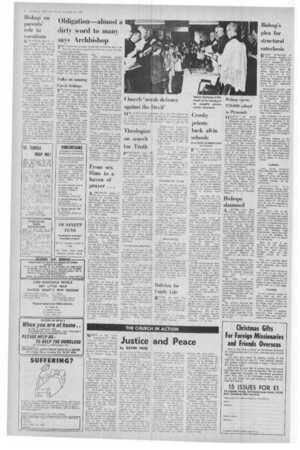Page 2, 24th November 1972
Page 2

Report an error
Noticed an error on this page?If you've noticed an error in this article please click here to report it.
Tags
Share
Related articles
Bridging The Generation Gap
Education Theme For Conference
From The Bishops' Diaries
From The Bishops' Diaries
Bishop For The C.p.e.a.
Bishop's plea for structural catechesis
BISHOP WORLOCK of Portsmouth, attending last
Saturday's Brentwood Diocesan Education Conference spoke in favour of an age-structured cat echesis. "How often," asked the Bishop, "does the score sheet (the examination of conscience) of a seven-year-old blind the conscience of the middle-aged penitent who has known no other adaptation over the years?"
"Sacramental growth and understanding must be taken into account, if we are to close the gap between religion and life. Preparation for the sacraments is unrealistic without considering the followup, the after-care. Preparation for the wedding ceremony is one thing, preparation for marriage is quite another."
The conference was on the problems of religious education with special reference to the sacraments "These problems are not simply confined to catechetical method" said Bishop Worlock. "They cannot he divorced from the liturgical celebration."
Although changes in the liturgy upset some people "we live in times when there has to be some experimentation. They are times of accelerating change. This affects the whole background, to the degree and manner that individuals feel able to engage in community exercise."
LAPSING Later during discussion Bishop Worlock said we should not make superficial judgements about the amount of lapsing. We must realise the "appalling pressures on our community."
,Historically, with disestablishment taking place even in Catholic countries now, the Church was having to stand on its own 'feet. So we should not be surprised if there was a contain falling off. "AN this affects the age of commitment, deeper commitment that is, of the child."
Mrs. Muir, wife of Mr. Kevin Muir, secretary of the Laity Commission and herself a teacher, a mother, and school counsellor, said "Children who come 'to our schools from good Catholic.. homes these days come from backgrounds where there are tensions, even disagreements, about the faith. This is a new problem, but these changes have not altered the lapsing rate.
"Sixty per • cent of our children are not attending Mass. They are very 'hesitant about this; they are not bothered. They ask, why should church be compulsory?"
They were troubled about the efficacy of the church in social problems and about birth control.
"The other day a group of boys came to me and said 'miss, is it our responsibility to carry contraceptives or is it the girl's?' With them staying on longer we have children in our schools who are in fact engaged."
GLOOMY It was a gloomy picture in many ways, she said and teachers were affected by it and became uncertain. "They are no longer fully confident of their ability to put across the truths of the Church."
The problems of religious education were centred on children when equal attention ought to be paid to adults.
blog comments powered by Disqus











